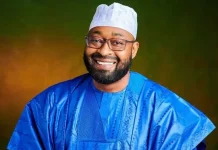The Senate on Thursday began the debates on the general principles of the N27.5 trillion 2024 budget presented to the joint session of the National Assembly by President Bola Tinubu on Wednesday.
The Senate Leader, Opeyemi Bamidele (Ekiti Central) moved a motion for the Appropriation Bill to be read for the second time, taking the president’s presentation to the joint session of the National Assembly the previous day as the first reading.
Opeyemi’s Bill seeks to authorize the issue out of the Consolidated Revenue Fund of the Federation the total sum of Twenty Seven Trillion, Five Hundred Billion Naira (N27, 500, 000, 000, 000) only for the year ending on the 31st day of December, 2024.
Leading debate on the 2024 Appropriation bill, Opeyemi said the major highlights of the budget are as follows:
“Basic assumptions and parameters of oil price benchmark of 77.96 US dollars per barrel; daily oil production estimate of 1.78 million barrels per day (inclusive of condensates of 300,000 to 400,000 barrels per day); exchange rate of 750 naira per US dollar and projected GDP growth rate of 3.75 percent and 17.16 percent inflation rate”.
Based on these fiscal assumptions and parameters, he said total federally-collectible revenue is estimated at 16.87 trillion naira in 2024.
“Total federally distributable revenue is estimated at 11.09 trillion Naira in 2024, while total revenue available to fund the 2024 federal budget is estimated at 9.73 trillion naira including the revenues of 63 government-government-owned enterprises.
“Oil revenue is projected at 1.92 trillion naira, non-oil taxes are estimated at 2.43 trillion naira, FGN independent revenues are projected to be 2.21 trillion naira.
“Other revenues total 762 billion naira, while the retained revenues of the GOEs amount to N2.42 trillion naira.
The budget has planned 2024 expenditure of 27.5 trillion naira proposed for the Federal Government in 2024 proposed 27.5 trillion naira 2024 expenditure comprises statutory transfers of N744.11 billion; non-debt recurrent costs 10.26 trillion naira, personnel costs of N4.99 trillion.
“Pensions, gratuities and retirees’ benefits of N854.8 billion and overheads of N1.11 trillion.
The bill haven passed second reading, and after the Leader’s Lead debate, the Senate President, Godswill Akpabio then announced to the members that 13 members had indicated interest to speak on the first allotted day and allotted 3 minutes to each speaker.
As senators then took turns to speak, they expressed satisfaction with the proposals, but feared that the problem with Nigeria has always been implementation, not good laws.
Speaking on capital expenditure, Senator Joel Onowakpo (Delta West) said “we have never had it so good”, adding “some things lacking such as roads and other infrastructure will be achieved in the budget.
He said apart from oil revenue, non-oil revenue was moved from 10% to 18%, which means the nation’s dependence on oil revenue is gradually given way.
Senator Garba Maidoki (Kebbi South) who said the budget has captured the needs of Nigerians, however said the problem of the country has been in the implementation of her laws.
“I am particularly happy with the capital estimates”, but advised that the projects should be “distributed equitably”, adding that he has seen “improved security in the last six months”.
Senator Binos Yaroe (Adamawa South) said President Bola Tinubu was not fair to the National Assembly for bringing the budget to the National Assembly late and expect them to do a thorough job in a few weeks.
He said the executive took months to put the budget together, but expects the National Assembly to consider and pass it in a few weeks for the country to maintain the January to December budgetary circle.
According to him, the president did the same in the earlier two supplementary budgets he presented to the National Assembly, thereby making them to “rush”.
By Haruna Salami




